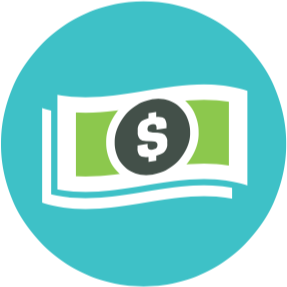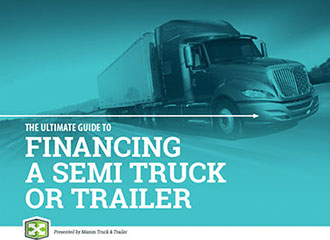20 Questions to ask about Financing a Truck or Trailer
 Nearly every big business was once little more than an idea scrawled out on the back of a napkin. Because they started out on a shoestring budget, many of them got off the ground by financing their transportation needs.
Nearly every big business was once little more than an idea scrawled out on the back of a napkin. Because they started out on a shoestring budget, many of them got off the ground by financing their transportation needs.Lindsey Frego and Cheryl Rathgaber, Finance & Insurance Professionals at Maxim Truck & Trailer, have over 30 years of combined finance experience helping companies of all sizes find the optimal interest rate, the best insurance and warranties, and ideal payment options.
With their financing experience, they can also help you prepare your application so you minimize the length of the approval process, even if you’ve had credit issues in the past.
| 1 | Why should I finance at a dealership versus a Bank? Financing at a dealership can often mean less work for the customer than going to their own bank or financial institution. A dealership’s finance manager will orchestrate the necessary paperwork to structure the best financing to fit your needs. Every customer is unique and so are their financing requirements. Ideally, your lease or loan will be tailored to fit your needs. |
| 2 | What interest rate can I get? Your interest rate depends on your credit history, the term of your lease or loan, the type of equipment you want to buy, and how you want to use it. It’s much more than your beacon score; you should have a good repayment history and experience in the industry to get your ideal interest rate. |
| 3 | What is the financing process? Once you sign the offer to purchase with your salesperson, a finance manager will contact you to determine your financing needs and proceed with completing a credit application and collect any additional documentation. Some finance companies require your most recent 2 years of tax returns, but every finance company is different. |
| 4 | Do all leases have a purchase option (residual buyout) at the end? Yes. The residual can be set at as low as $1 or as high as the anticipated Fair Market Value (FMV) at the end of the term. Residuals are based on the structure of the financing, including term and type of equipment. The finance manager will help you decide what type of lease is best for you. |
| 5 | Can I get pre-approved? Pre-approvals are not a common practice. Once the offer to purchase is signed, the finance manager can provide lenders with specific equipment information to obtain your approval. There are numerous lenders and finance products available, so the success rate for an approval is very high. |
| 6 | How long does the approval process take? Usually between 24 and 48 hours. If the lender requires additional information, such as a recent tax return, a statement of business activities, or a letter from your employer, the approval may be prolonged. |
| 7 | Can I buy life and/or disability insurance? If so, can I add it to the financing? Insurance options should be available to protect your investment and livelihood, so your equipment is paid for when it’s not paying you. A full complement of insurance options to cover you and your family can include Life, Disability, Accident Only, or Critical Illness. Your finance manager has coverage available to help you feel safe and secure about your financial commitments. |
| 8 | Is there anything to cover my loan or lease if my equipment is written off? Yes. Your finance manager will offer Gap insurance, which will pay the shortfall between your insurance settlement and the amount still owing on your loan or lease in the case of a total loss. |
| 9 | I have had credit problems or trouble getting financed in the past. Can you still get me approved? Yes. The finance managers have access to a wide variety of lending institutions that provide financing options for most credit profiles. They will work with you to find the best option that is compatible with your budget. Some lenders may require additional security or equity, such as more money down or a co-signer. |
| 10 | I’m a first-time owner/operator. What do I need to get approved? Lenders will be looking for a combination of good credit repayment history, property ownership, a letter of employment, and industry driving experience. You will also need to apply a cash down payment of 10 to 15 per cent. |
| 11 | How much money do I need to put down as a down payment? The industry standard is 10% of the purchase price. The finance manager will work with you and your credit profile to find the best combination so you qualify for an approval, and for a payment that works within your budget. |
| 12 | What makes up my monthly payments? Your interest rate, the term of your loan, how much you’re putting as a down payment, and if there is a residual amount—all are the primary drivers of your monthly payment. |
| 13 | How can I make my payments lower? Payments can be lowered by adding more money to your down payment, lengthening the term of the contract, or increasing residual on a lease. |
| 14 | Can I pay off my loan or lease early? Yes. Because most loans and leases in the heavy equipment industry are not open, finance companies consider the payout to be the balance of payments. If you plan on buying out your contract early, your finance manager can structure a lease around your business plan and needs. |
| 15 | How often will my payments be? Usually, loan and lease payments are made on a monthly basis. If necessary, it can be arranged for payments to be made quarterly, semi-annually, or annually. It’s also possible to do seasonal payments. For example, if you have a landscaping company and do most of your business and revenue in the summer, your payments could be scheduled to be higher in the spring, summer, and fall, and lower in the winter. |
| 16 | How do I make my monthly payment? You will need to provide a void cheque so the payments can be taken directly out of your bank account. |
| 17 | Does my trade-in count towards my down payment? Yes. If you are purchasing a unit for $50,000 and the dealer values your trade-in at $20,000, your balance to finance will only be $30,000. |
| 18 | What if I have a balance owing on my trade? The dealer will pay out the balance owing on that equipment and the remaining equity will be applied to your down payment. |
| 19 | What’s the difference between a lease and a loan? In a lease, the lender owns the equipment until the purchase option is exercised, and you are responsible to pay your taxes monthly on each payment. With a loan, you are the owner of the equipment, and the taxes are included in the financing. It is always best practice to speak with your accountant to determine which type of financing has the most tax benefits for you and your company. Credit criteria for a loan or a lease are the same. |
| 20 | If I need a major repair on my equipment that has nothing owing on it and I can’t afford to pay the bill, can I finance the repair? Yes, provided the repair is less than 75% of the appraised value of the equipment. |







